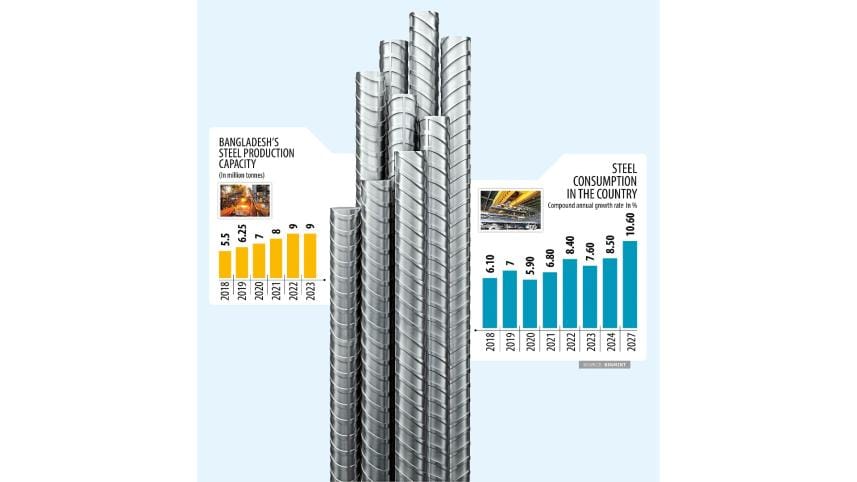Steel consumption to increase 25% by 2027: study

Steel consumption in Bangladesh is projected to rise by 25 percent to around 1.06 crore tonnes in 2027 from 85 lakh tonnes in 2024 thanks to growing infrastructure development projects and individual consumption, according to Bigmint.
Bigmint, an India-based platform for price reporting, market intelligence and consulting for commodities, made this projection at its 4th Bangladesh International Trade Summit 2024.
As consumption is expected to rise, manufacturers are already enhancing their production capacity while investors are pouring money to set up new steel mills, according to industry insiders.
Six conglomerates -- including Meghna Group of Industries, PHP Group of Industries, Bashundhara Group and Anwar Group of Industries -- are setting up new factories and expanding manufacturing capacities.
Meghna Group of Industries is investing an estimated $400 million to establish a steel plant with an annual production capacity of 14 lakh tonnes at the Cumilla Economic Zone.
PHP Group plans to establish a steel factory at the Bangabandhu Sheikh Mujib Shilpa Nagar (BSMSN) in Chattogram's Mirsarai. At peak production, it can churn out 30 lakh tonnes of steel annually.
Bashundhara Group, one of the largest business groups in Bangladesh, has almost completed setting up two steel mills with a total investment of $500 million at the BSMSN, according to sources at the Bangladesh Economic Zones Authority. More than 20 lakh tonnes of hot-rolled coils will be produced annually at the two mills.
Anwar Group, in order to raise its market share, also has investments of more than Tk 4,000 crore in the pipeline to build a new factory in Gajaria of Munshiganj.
At present, around 40 steelworks are active in Bangladesh with a combined capacity of 90 lakh tonnes of steel. Bangladesh currently requires around 85 lakh tonnes of steel annually.
According to Bigmint's projection, Bangladesh's steel production capacity will increase to 1.30 crore tonnes by 2027.
Bigmint also said that despite having more steel mills, the Dhaka zone's production capacity is less than Chattogram's.
It said Chattogram accounted for 62 percent of the total steel-melting capacity while Dhaka only met 32 percent.
"The demand for steel will increase day by day if the economy just starts to recover. The demand will increase by at least 30 lakh tonnes within the next three years," said Tapan Sengupta, deputy managing director of BSRM, the largest steel maker in the county.
Sengupta said the requirement for scrap steel will also increase by around 20 lakh tonnes just for the manufacture of rods.
Md Shahidullah, managing director of Metrocem Steel, said Bangladesh currently imports around 55 lakh tonnes of scrap steel to manufacture steel rods, adding that imports would increase within 2 to 3 years as demand and manufacturing capacity are growing.
While addressing the inaugural session of the 4th Bangladesh International Trade Summit 2024 at the Pan Pacific Sonargaon, Nurul Majid Mahmud Humayun, minister of industries, said Bangladesh's economy is imbued with potential, dynamism and resilience.
It is one of the fastest-growing countries in the world in terms of GDP with an average growth rate of 7 percent, he added.
The country is now looking to the future by embracing sustainable solutions for industries and power generation, he said.
Aameir Alihussain, managing director of BSRM Bangladesh, said: "We will need to ensure uninterrupted electricity supply to factories in the future.
"Of course, there are challenges of high inflation and high interest rates. Hopefully, this will ease in future," he said.





 For all latest news, follow The Daily Star's Google News channel.
For all latest news, follow The Daily Star's Google News channel.
Comments